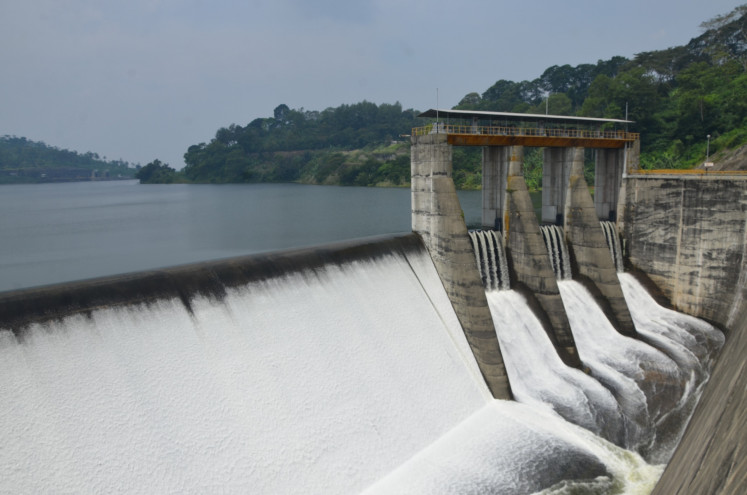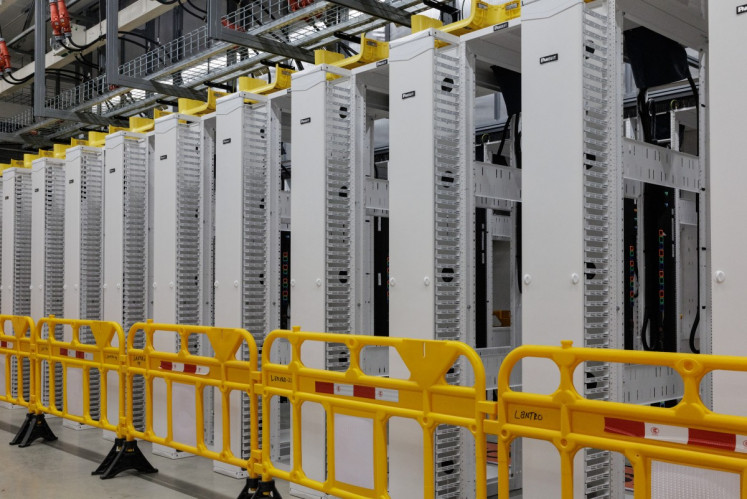Popular Reads
Top Results
Can't find what you're looking for?
View all search resultsPopular Reads
Top Results
Can't find what you're looking for?
View all search resultsBuilding a more meaningful and inclusive digital future for Indonesia
Change text size
Gift Premium Articles
to Anyone
O
ver the past decade, the lives of Indonesians, especially those in urban areas, have changed dramatically. Daily activities now rely heavily on digital technology: from ordering food, working, studying to socializing, all can be done through mobile devices.
This transformation, once unimaginable, has made fast and widespread internet access the backbone of modern comfort.
According to the Indonesian Internet Service Providers Association (APJII), internet connectivity has reached 80.66 percent of the population in 2025, while Statistics Indonesia (BPS) recorded that smartphone ownership stood at 68.65 percent in 2024. As a result, much of the nation’s social interaction has shifted online, with 60 percent of citizens relying on social media as their main source of information, as Reuters’ Digital News Report outlined in 2024.
These developments have been accelerated even further by the rise of artificial intelligence (AI) technologies, such as ChatGPT and Gemini, which are increasingly integrated into everyday life.
However, Prasetya Dwicahya, managing partner at advisory firm AMANA Solutions, told The Jakarta Post that behind this convenience and efficiency lies a major unfinished task: ensuring that digital transformation is truly inclusive, high-quality and meaningful for all segments of society.
He pointed to how Internet access in Indonesia still faces serious challenges, such as how the cost of national fixed broadband services stands at around US$ 0.41 per Mbps per month, the highest in Southeast Asia according to a We Are Social report in 2025. Meanwhile, the Communications and Digital Ministry recorded that the average internet speed in Indonesia is 61.90 Mbps in 2025, far behind Malaysia and Vietnam which both exceed 140 Mbps.
“This disparity highlights the urgent need for more progressive policies to make the internet an affordable and equitable public utility. Fast and affordable internet is not merely a technical goal, but a foundation of digital justice for all citizens,” Prasetya explained.
However, he noted that building access alone is not enough, as the next challenge lies in maintaining reasoning capacity amid the flood of information.
Research by Gloria Mark from the University of California, Irvine, the United States, shows that excessive exposure to digital media can significantly reduce attention span and focus. This directly affects critical thinking skills, which in turn determine a nation’s competitiveness in the future.
“Policies such as PP Tunas, designed to protect children in digital spaces, are an important step toward ensuring a safer online environment for the younger generation. However, their implementation must remain transparent, participatory and accountable to avoid eroding public and industry trust. Other initiatives like the Indonesian Game Rating System (IGRS) must also be strengthened to ensure cross-border digital content supervision remains disciplined and adaptive to technological change.”
In addition, the Communications and Digital Ministry’s ongoing digital literacy programs, reaching youth across 21 provinces and 57 districts/cities in 2025, also play a crucial role in equipping the next generation with stronger digital and reasoning skills.
At the same time, the rise of AI presents both opportunities and challenges. A 2025 study by Lichtinger & Massoum indicates that entry-level jobs may decline due to AI-driven automation, though another report by the World Bank found that AI can significantly enhance learning outcomes when used responsibly.
”This duality underscores the importance of national digital policies that balance workforce protection with innovation promotion,” Prasetya said.
As Indonesia’s digital landscape has changed profoundly in the past decade, he continued, digital policy can no longer focus only on infrastructure or technology, it must center on people. To make transformation meaningful, Prasetya outlined the three priorities that stand out: access, rationalities and innovation.
In terms of access, inclusive internet access is essential.
“The Communication and Digital Ministry should set clear targets to lower internet costs, now among the highest in Southeast Asia, by encouraging healthy industry consolidation, fair incentives and shared broadband infrastructure to expand coverage.”
Secondly, digital progress must go hand in hand with education.
“Collaboration between digital and education policies is key to helping citizens think critically amid the flood of online content. Protecting against hoaxes and harmful content is important, but strengthening public reasoning is what sustains democracy,” he explained.
With AI increasingly becoming more prevalent in our daily lives, Prasetya emphasized the need for balance in the face of great promise.
“The upcoming Presidential Regulation on AI should promote responsible innovation through collaborative “sandbox” trials between government and industry. The communication and digital ministry must act swiftly to harness opportunities while managing risks.”
To that end, meaningful digital transformation is not only about speed or technology, but rather empowering people and ensuring how much benefit it brings to people’s lives, developing their minds, character and reasoning abilities.
“Ultimately, the true essence of digital transformation is not the speed at which data moves, but the intelligence that grows behind it,” Prasetya concluded.











